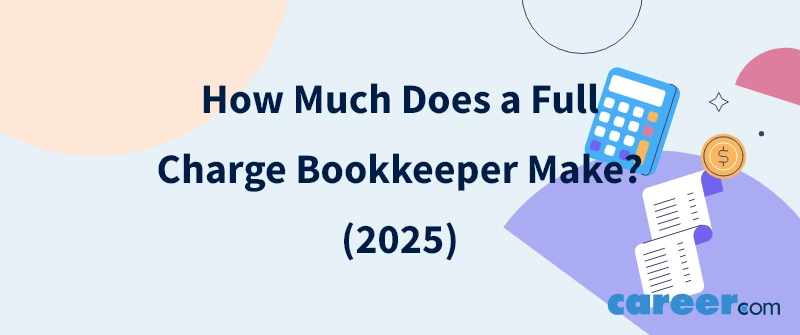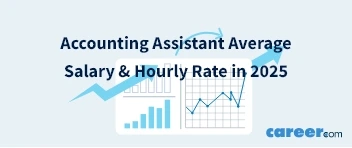How Much Does a Full Charge Bookkeeper Make? (2025)

Every organization needs a professional who will manage the financial records and activities. This designated person is what we call a full charge bookkeeper.
Doing beyond the scope of a regular bookkeeper, full charge bookkeepers are responsible for the whole accounting cycle and finance affairs of the company. As of January 1, 2025, their average annual salary is $44,960 in the United States.
Read this salary guide as we thoroughly discuss a full charge bookkeeper’s responsibility, salary insights, factors that affect their compensation, and how to become one.
What does a Full Charge Bookkeeper do?
Full charge bookkeepers are finance professionals who supervise and manage all accounts in a company. They are responsible for recording and maintaining complete and systematic business transactions.
They also reconcile accounts, balance ledgers, and prepare reports with receipts, expenditures, accounts receivable, and payable.
The job title requires 1 to 3 years of related experience and may require an associate degree or equivalent. They normally report to a supervisor or manager and operate under moderate supervision.
What is Full Charge Bookkeeper Salary Overview?
As of January 1, 2025, the average salary for full charge bookkeepers in the United States is $44,960 per year. The range for full charge bookkeeper salaries in the U.S. goes from $35,943 to $54,799, with earning mostly between $40,240 and $50,110.
The average monthly rate is $3,747 with a range from $2,995 to $4,567 while the average hourly rate is $22 with a range from $17 to $26.
2025 Full Charge Bookkeeper Salary: $44,960 per year ($22 per hour)
Depending on the percentile, a full charge bookkeeper salary with bonus ranges from $36,260 to $55,307, with $45,220 as the average value.
| Percentile | Salary + Bonus |
|---|---|
| 10th Percentile | $36,260 |
| 25th Percentile | $40,530 |
| 50th Percentile | $45,220 |
| 75th Percentile | $50,500 |
| 90th Percentile | $55,307 |
The average total compensation for full charge bookkeepers, including the core compensation and benefits, is $67,843. The median base salary makes up 66.3% of the total pay while benefits like social security, healthcare, and time off make up 25.6%.
| Core Compensation | ||
|---|---|---|
| Median | % of Total | |
| Base Salary | $44,960 | 66.3% |
| Bonus | $260 | 0.4% |
| Value of Benefits | ||
| Social Security | $3,459 | 5.1% |
| 401K/403B | $1,899 | 2.8% |
| Disability | $904 | 1.3% |
| Healthcare | $8,352 | 12.3% |
| Pension | $2,442 | 3.6% |
| Time Off | $5,566 | 8.2% |
| Total Compensation | $67,843 | 100% |
What Can Affect Full Charge Bookkeeper’s Salaries?
Experience level, geographic location, education, and skills are important factors that can affect the salary for full charge bookkeepers. Here are the detailed effects of these factors in terms of compensation every year.
By Experience Level
The salary of full charge bookkeepers increases as experience level advances. An entry-level full charge bookkeeper salary is $43,077 while the expert level with over 8 years of experience gets paid $47,285 on average.
| Levels | Salary |
|---|---|
| Entry Level Full Charge Bookkeeper | $43,077 |
| Intermediate Level Full Charge Bookkeeper | $43,216 |
| Senior Level Full Charge Bookkeeper | $44,992 |
| Specialist Level Full Charge Bookkeeper | $47,132 |
| Expert Level Full Charge Bookkeeper | $47,285 |
By Geographic Location
Key factors why geographic location affects salaries in the United States are the local economy, cost of living, and industry presence. Here are 6 hot cities in the US, where there are competitive full charge bookkeeper salaries:
| Cities | 25th Percentile | 50th Percentile | 75th Percentile |
|---|---|---|---|
| San Jose, California | $50,500 | $56,420 | $62,890 |
| San Francisco, California | $50,300 | $56,190 | $62,640 |
| Oakland, California | $49,090 | $54,840 | $61,130 |
| New York, New York | $47,000 | $52,510 | $58,530 |
| Queens Village, New York | $46,680 | $52,150 | $58,130 |
| Paramus, New Jersey | $46,360 | $51,790 | $57,720 |
Based on the data by Salary.com, San Jose has the most competitive pay, ranging from $50,500 to $62,890, while Paramus has the least, with salaries ranging from $46,360 to $57,720.
By Skills
Full charge bookkeepers with more acquired skills get higher pay, especially with competencies with higher demands.
Data from Salary.com's Real-time Job Posting Salary Data Report suggests that for an intermediate-level full charge bookkeeper, accounting skills can give the highest pay increase by 74.16%, while skills in financial statements have the highest demand with +13.80%.
Some important skills also include bookkeeping, general ledger, accounts receivable and payable, and bank reconciliation, and payroll processing.
| Skills | Increase (%) | Demand (%) |
|---|---|---|
| Accounting | 74.16% | +3.16% |
| Bookkeeping | 54.01% | +3.28% |
| Accounts Payable | 35.69% | +8.99% |
| Accounts Receivable | 26.04% | +8.97% |
| General Ledger | 19.09% | +7.60% |
| Financial Statements | 12.67% | +13.80% |
By Education
In terms of education, full charge bookkeepers mostly have a bachelor’s degree at 33.8%, followed by those with high school diplomas at 32.7%. Meanwhile, those with a doctorate only belong to 0.2%, the lowest among the degree levels.
| Degree Level | % of Users with this Level of Education |
|---|---|
| High School | 32.7% |
| Associates | 28.6% |
| Bachelors | 33.8% |
| Masters | 3.8% |
How to Become a Full Charge Bookkeeper
The requirement to be a full charge bookkeeper varies. Some require having taken a college course or a bachelor’s degree in accounting, business, or a related field. While others only need a high school diploma as the employees would be able to learn some skills in the workplace.
The job title requires 1 to 3 years of related experience and may require an associate degree or equivalent.
Moreover, having a professional certification is not usually required in becoming a full charge bookkeeper. However, proficiencies can be demonstrated by applying through different certifying bodies.
They can get a Certified Bookkeeper designation given by the American Institute of Professional Bookkeepers and a Certified Public Bookkeeper awarded by the National Association of Certified Public Bookkeepers once they pass the exams and complete the requirements.
Important qualities must also be present when becoming a full charge bookkeeper. Here are some of them:
- Computer skills
- Analytical skills
- Math skills
- Integrity
- Detail-oriented
What are the FAQs about Full Charge Bookkeeper?
Here are some common questions about full charge bookkeepers:
What is the difference between a full charge bookkeeper vs accountant?
Full charge bookkeepers record and organize financial affairs. They do routine computations to guarantee accurate finance records and classifications and ensure smooth business transactions.
Meanwhile, accountants give strategic consultations and analyses of financial statements. They handle taxes, identify opportunities and risks, and interpret data for optimum company efficiency.
Is there a full charge bookkeeper certification?
Having a professional certification is not usually required in becoming a full charge bookkeeper. However, proficiencies can be demonstrated by applying through different certifying bodies.
They can get a Certified Bookkeeper designation given by the American Institute of Professional Bookkeepers and a Certified Public Bookkeeper awarded by the National Association of Certified Public Bookkeepers once they pass the exams and complete the requirements.
What is the difference between a full charge bookkeeper vs bookkeeper?
Full charge bookkeepers are responsible for the whole accounting cycle and finance affairs of the employers. Meanwhile, standard bookkeepers are limited to basic data entry and maintenance of the records.



